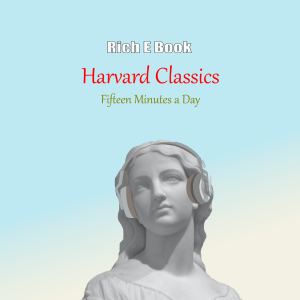
280.8K
Downloads
736
Episodes
Former President of Harvard University Charles W. Eliot wrote in his introduction to the Harvard Classics, "In my opinion, a five-foot shelf would hold books enough to give a liberal education to any one who would read them with devotion, even if he could spare but fifteen minutes a day for reading." Here you are, you can easily listen to his entire 15-minutes-a-day study guide while commuting to and from work (most of us spend far more than 15 minutes a day commuting each day), doing mundane work in the office, washing dishes at home, or doing most of the things day in and day out. It is so easy, so entertaining, and so educational that they can be listened to again and again, until they permeate into our own thinking and into our characters. Perhaps, in one year's time, you will become someone you barely recognize, all for the better. Who knows?
-- Rich E Book
Former President of Harvard University Charles W. Eliot wrote in his introduction to the Harvard Classics, "In my opinion, a five-foot shelf would hold books enough to give a liberal education to any one who would read them with devotion, even if he could spare but fifteen minutes a day for reading." Here you are, you can easily listen to his entire 15-minutes-a-day study guide while commuting to and from work (most of us spend far more than 15 minutes a day commuting each day), doing mundane work in the office, washing dishes at home, or doing most of the things day in and day out. It is so easy, so entertaining, and so educational that they can be listened to again and again, until they permeate into our own thinking and into our characters. Perhaps, in one year's time, you will become someone you barely recognize, all for the better. Who knows?
-- Rich E Book
Episodes

Thursday Mar 31, 2022
Introductory Note: Izaak Walton
Thursday Mar 31, 2022
Thursday Mar 31, 2022
Introductory note on Izaak Walton (Volume 15, Harvard Classics)

Thursday Mar 31, 2022
The Life of Dr. Donne, by Izaak Walton
Thursday Mar 31, 2022
Thursday Mar 31, 2022
Monuments are usually made from death masks, but John Donne took pleasure in posing for his, wrapped from head to foot in a shroud. Isaak Walton tells of this in his fascinating biography of the eccentric poet. (Volume 15, Harvard Classics)
John Donne died March 31, 1631.

Wednesday Mar 30, 2022
Introductory Note: Alessandro Manzoni
Wednesday Mar 30, 2022
Wednesday Mar 30, 2022
Introductory note on Alessandro Manzoni (Volume 21, Harvard Classics)

Wednesday Mar 30, 2022
I Promessi Sposi (Ch. 31), by Alessandro Manzoni
Wednesday Mar 30, 2022
Wednesday Mar 30, 2022
"I Promessi Sposi," a seventeenth century novel, vividly describes the devastating plague of Milan. Then whole families sickened in a few hours and died in less than a day's time of strange and violent complaints whose symptoms were unknown to physicians. (Volume 21, Harvard Classics)
Capuchin monks given charge of the plague hospital in Milan, March 30, 1630.

Tuesday Mar 29, 2022
Introductory Note: The Story of the Volsungs and Niblungs
Tuesday Mar 29, 2022
Tuesday Mar 29, 2022
Introductory note on The Story of the Volsungs and Niblungs (Volume 49, Harvard Classics)

Tuesday Mar 29, 2022
The Story of the Volsungs and Niblungs (Ch. 24-27)
Tuesday Mar 29, 2022
Tuesday Mar 29, 2022
Brynhild, favorite goddess of Norse mythology, plighted troth with Sigurd, fearless warrior. But Sigurd forgot Brynhild and married Gudrun, whose brother, Gunner, then set out to win the beautiful Brynhild. Complications very like a modern triangle arose. (Volume 49, Harvard Classics)

Monday Mar 28, 2022
Introductory Note: Adam Smith
Monday Mar 28, 2022
Monday Mar 28, 2022
Introductory note on Adam Smith (Volume 10, Harvard Classics)

Monday Mar 28, 2022
Wealth of Nations (Book I, Ch. 1), by Adam Smith
Monday Mar 28, 2022
Monday Mar 28, 2022
The making of a simple pin is one of the most complex affairs of modern industry. Adam Smith regards the process from the worker's point of view, and shows the many and varied economic principles that are involved in pin making. (Volume 10, Harvard Classics)

Sunday Mar 27, 2022
Introductory Note: Robert Louis Stevenson
Sunday Mar 27, 2022
Sunday Mar 27, 2022
Introductory note on Robert Louis Stevenson (Volume 28, Harvard Classics)

Sunday Mar 27, 2022
Truth of Intercourse, by Robert Louis Stevenson
Sunday Mar 27, 2022
Sunday Mar 27, 2022
Is lying or quibbling ever permissible? May one juggle words so a truth is conveyed through a lie and a lie told by a truth? Stevenson unravels this puzzle. (Volume 28, Harvard Classics)
